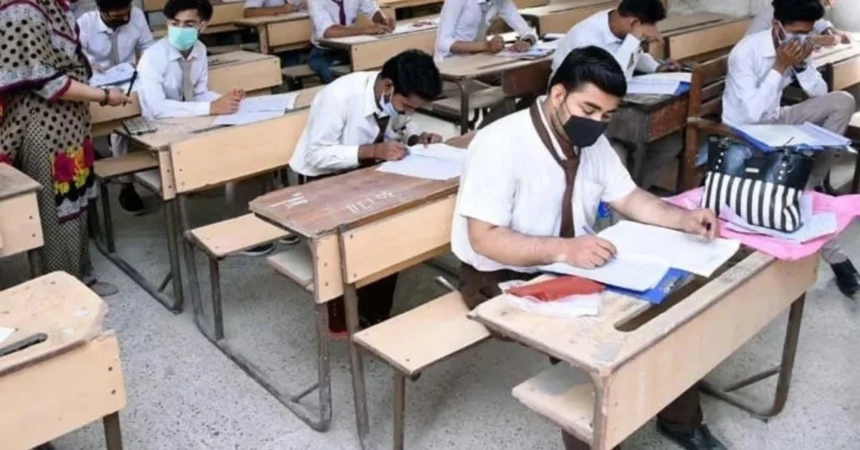Introduction
In a landmark decision, the Sindh government has announced a new grading policy for matriculation and entrance-level examinations, slated for implementation in 2025. This significant change aims to modernize the evaluation system and promote a more holistic approach to student assessment. By eliminating traditional ranking methods, the new policy seeks to foster an environment that encourages academic growth and development rather than mere competition.
- Introduction
- Background of the Grading Policy
- Key Features of the New Grading Policy
- The Role of Technology in Education
- Challenges and Concerns
- Public Reaction and Support
- Long-Term Vision for Education in Sindh
- Teacher Training and Professional Development
- Parental Involvement and Engagement
- Addressing Socioeconomic Disparities
- Collaboration with Educational Institutions
- Monitoring and Evaluation
- A Step Towards Educational Reform
Background of the Grading Policy
Historically, the education system in Pakistan has faced numerous challenges, particularly concerning the grading and evaluation methods employed. The previous system, which awarded first, second, and third positions, often placed undue stress on students and created an unhealthy competitive atmosphere. The Sindh education authorities recognized the need for reform, which led to the drafting of this new policy. The goal is to create a fairer and more equitable educational landscape for all students.
Key Features of the New Grading Policy
The new grading policy introduces several key features that aim to enhance the educational experience for students across Sindh:
1. Elimination of Traditional Rankings: By abolishing the conventional practice of ranking students based on their performance, the new policy aims to reduce competition and pressure among students. Instead of focusing on who comes first, students will be evaluated on their individual progress and understanding of the material.
2. Continuous Assessment: The policy emphasizes continuous assessment, where students are evaluated based on their performance throughout the academic year rather than relying solely on final examinations. This approach encourages regular engagement with the material and helps identify areas where students may need additional support.
3. Holistic Evaluation: The new grading system will consider various factors, including class participation, assignments, projects, and practical examinations. This comprehensive evaluation method ensures that students are assessed on a broader range of skills and abilities, promoting a more well-rounded educational experience.
4. Focus on Skill Development: The grading policy aligns with the government’s vision of fostering skill development and critical thinking among students. By prioritizing skills over rote memorization, the new approach encourages students to develop a deeper understanding of the subject matter and apply their knowledge in practical situations.
5. Teacher Training and Support: To ensure the successful implementation of the new grading policy, the Sindh government plans to invest in teacher training programs. Educators will receive the necessary resources and support to adapt to the new assessment methods, ensuring a smooth transition for both teachers and students.
The Role of Technology in Education
As part of the modernization efforts, the Sindh government recognizes the importance of incorporating technology into the education system. The new grading policy encourages the use of digital tools and platforms to facilitate learning and assessment. Online resources, e-learning modules, and educational software will be utilized to enhance the overall educational experience and provide students with access to a wealth of knowledge.
Challenges and Concerns
While the new grading policy represents a positive step toward improving education in Sindh, it is not without challenges. Some educators and parents have expressed concerns regarding the transition from the traditional system to the new framework. Questions regarding the adequacy of training for teachers, the clarity of assessment criteria, and the potential for disparities in implementation across different schools remain.
Public Reaction and Support
The announcement of the new grading policy has sparked various reactions among stakeholders in the education sector. Many parents and students have welcomed the change, citing the need for a more balanced and less stressful approach to education. Educational experts also support the initiative, emphasizing its potential to create a more equitable learning environment.
Long-Term Vision for Education in Sindh
The Sindh government’s new grading policy is part of a broader vision to reform the education system in the province. By modernizing evaluation methods and promoting skill development, the government aims to prepare students for the challenges of the 21st century. The long-term vision includes not only academic success but also the cultivation of responsible, informed citizens who can contribute positively to society.
Teacher Training and Professional Development
To effectively implement the new grading policy, the Sindh government understands the necessity of providing adequate training for teachers. Professional development programs will be established to familiarize educators with the new assessment methods, tools, and technologies. These initiatives will equip teachers with the skills needed to assess students holistically and to utilize digital platforms effectively. Ongoing training will also create a feedback loop, allowing educators to share their experiences and insights, ultimately refining the grading process over time.
Parental Involvement and Engagement
The success of the new grading policy will heavily depend on parental involvement. The Sindh government plans to engage parents in discussions about the policy’s objectives and the importance of a supportive home environment for learning. Workshops and informational sessions will be organized to help parents understand how they can assist their children during this transition. By fostering a collaborative relationship between schools and families, the government hopes to create a supportive ecosystem that enhances student learning and well-being.
Addressing Socioeconomic Disparities
One of the critical challenges facing the education system in Sindh is addressing socioeconomic disparities. The government recognizes that not all students have equal access to educational resources, particularly in remote and underprivileged areas. As part of the new grading policy, efforts will be made to ensure that all schools, regardless of their location or funding, have access to the same quality of educational materials and training. This initiative will help level the playing field, ensuring that all students receive a fair chance to succeed.
Collaboration with Educational Institutions
To enhance the effectiveness of the new grading policy, the Sindh government plans to collaborate with various educational institutions, including universities and research organizations. This partnership will enable the development of evidence-based practices and innovative assessment techniques tailored to the local context. By leveraging the expertise of educational professionals and researchers, the government aims to create a robust framework for student evaluation that is both practical and effective.
Monitoring and Evaluation
Continuous monitoring and evaluation will be essential for the success of the new grading policy. The Sindh government will implement a system to regularly assess the effectiveness of the new grading practices and make necessary adjustments based on feedback from teachers, students, and parents. This adaptive approach will ensure that the policy remains relevant and effective, addressing any emerging challenges as they arise. Additionally, transparent reporting on the outcomes of the policy will help build trust among stakeholders and encourage continued support.
A Step Towards Educational Reform
The introduction of the new grading policy in Sindh marks a significant step towards comprehensive educational reform. By focusing on holistic assessment, technology integration, and equitable access to resources, the government aims to create an educational environment that fosters learning and personal growth. As the policy takes effect, ongoing collaboration among educators, parents, and the government will be crucial in ensuring its success and sustainability, ultimately benefiting the future generations of Sindh.
In conclusion, the new grading policy in Sindh marks a significant milestone in the province’s efforts to enhance its education system. By eliminating traditional rankings and promoting a holistic approach to assessment, the government aims to foster a more equitable and supportive learning environment for all students. As the implementation date approaches, it is crucial for stakeholders to collaborate and address any challenges that may arise, ensuring a successful transition to this new educational paradigm.
#SindhGradingPolicy #EducationReform #Matriculation #EntranceExams #PakistanEducation







